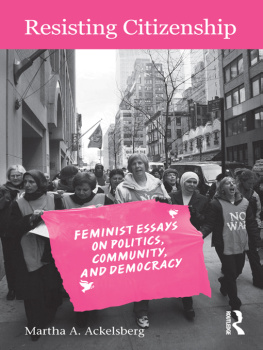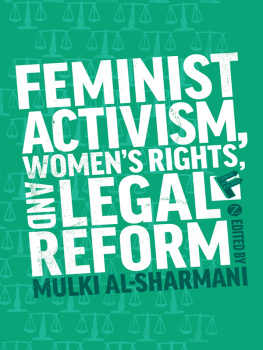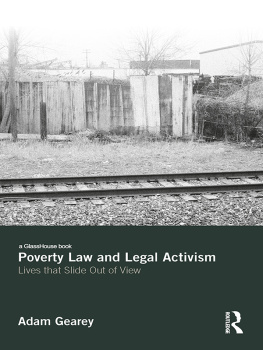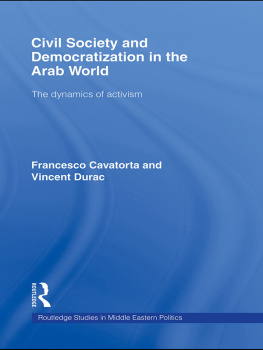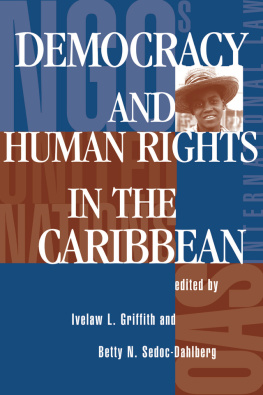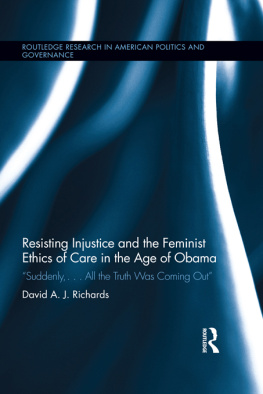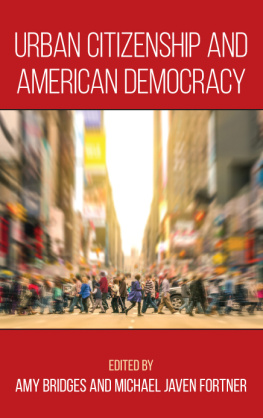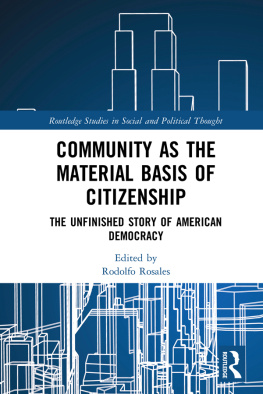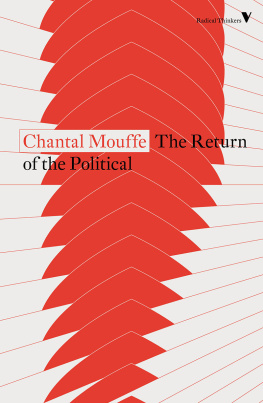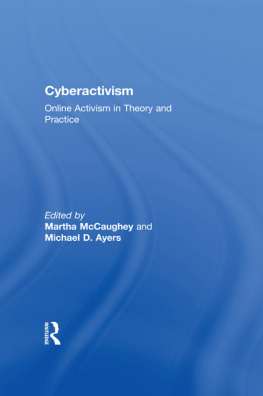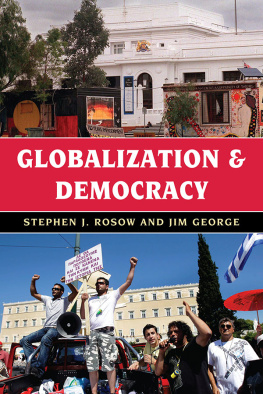RESISTING CITIZENSHIP
Political participation in Americasupposedly the worlds strongest democracyis startlingly low, and many of the civil rights and economic equity initiatives that were instituted in the 1960s and 1970s have been abandoned, as significant proportions of the populace seem to believe that the civil rights battle has been won. However, rates of collective engagement, like community activism, are surprisingly high. In Resisting Citizenship , renowned feminist political scientist Martha Ackelsberg argues that community activism may hold important clues to reviving democracy in this time of growing bureaucratization and inequality.
Resisting Citizenship brings together many of Ackelsbergs writings over the past 25 years, combining her own fieldwork and interviews with cutting-edge research and theory on democracy and activism. She explores these efforts in order to draw lessonsand attempt to incorporate knowledgeabout current notions of democracy from those who engage in non-traditional participation, those who have, in many respects, been relegated to the margins of political life in the United States.
Martha Ackelsberg is Five College Fortieth Anniversary Professor and William R. Kenan, Jr., Professor in the Department of Government and Program for the Study of Women and Gender at Smith College, USA. Her research and teaching interests are in applied democratic theory, urban politics, and feminist theory.
RESISTING CITIZENSHIP
Feminist Essays on Politics, Community, and Democracy
Martha A. Ackelsberg
First published 2010
by Routledge
270 Madison Ave, New York, NY 10016
Simultaneously published in the UK
by Routledge
2 Park Square, Milton Park, Abingdon, Oxon OX14 4RN
Routledge is an imprint of the Taylor & Francis Group, an informa business
2010 Taylor & Francis
Printed and bound in the United States of America on acid-free paper
by Walsworth Publishing Company, Marceline, MO
All rights reserved. No part of this book may be reprinted or
reproduced or utilized in any form or by any electronic, mechanical, or
other means, now known or hereafter invented, including photocopying
and recording, or in any information storage or retrieval system,
without permission in writing from the publishers.
Trademark Notice : Product or corporate names may be trademarks
or registered trademarks, and are used only for identification and
explanation without intent to infringe.
Library of Congress Cataloging in Publication Data
Ackelsberg, Martha A.
Resisting citizenship : feminist essays on politics, community and
democracy / Martha A. Ackelsberg.
p. cm.
Includes bibliographical references and index.
1. Women in politicsUnited States. 2. Political participationUnited
States. 3. FeminismUnited States. I. Title.
HQ1236.5.U6A22 2009
320.082dc22
2009003541
ISBN10: 0-415-93518-0 (hbk)
ISBN10: 0-415-93519-9 (pbk)
ISBN13: 978-0-415-93518-0 (hbk)
ISBN13: 978-0-415-93519-7 (pbk)
FOR MY STUDENTS
CONTENTS
PART I
Rethinking Politics/Rethinking Community |
| 1 |
| 2 |
| 3 |
| (WITH MYRNA MARGULIES BREITBART) |
PART II
Challenging Dichotomies: Dependency, Privacy, Identity, Power |
| 4 |
| 5 |
| (WITH MARY LYNDON SHANLEY) |
| 6 |
| (WITH MARY LYNDON SHANLEY) |
| 7 |
PART III
Is Citizenship the Goal? |
| 8 |
| 9 |
| 10 |
| 11 |
| 12 |
ACKNOWLEDGMENTS
A book that incorporates essays written over decades is indebted to so many friends and colleagues that it would be inconsiderate to the reader to list them all. Those who have helped me think through the ideas in particular essays are named in the acknowledgments to the individual essays. But some people have been so much part of my intellectual journey that I feel a need to thank them more directly.
My first debt is to my co-authors on a number of these essays, Mary Lyndon (Molly) Shanley and Myrna Breitbart, with whom I have had the pleasure and good fortune to share at least some components of our personal, political, and intellectual odysseys over these many years. Their friendships have been invaluable, as has been the opportunity to think through with them ideas about in/equality, anarchism, direct action, feminism, politics and the relationship between activism and the academy that animate these pages.
Molly is also a member of the Tower Ladies, an informal group of feminist political scientists who meet to read one anothers work, talk about teaching, and share our lives and struggles. Over the years, the group has provided invaluable support of the sort that feminist theologian Nelle Morton once termed hearing one another into speech. I am honored and blessed to have been able to participate in conversations with Amrita Basu, Cathy Cohen, Cynthia Enloe, Mary Katzenstein, Eileen McDonagh, Gwendolyn Mink and Molly Shanley.
Colleagues in the American Political Science Association and, in particular, in the Feminist Political Theory Group of the Western Political Science Association, have offered venues for the presentation and discussion of my work, and opportunities for the sort of challenging interactions that characterize academia at its best. Conversations over many years with Jane Bayes, Marla Brettschneider, Susan J. Carroll, Cynthia Daniels, Irene Diamond, Christine DiStefano, Kathy Ferguson, Janet Flammang, Joyce Gelb, Mary Hawkesworth, Nancy Hirschmann, Jyl Josephson, Jenny Mansbridge, Lori Marso, Kristen Monroe, Carole Pateman, Ann Robbart, Wendy Sarvasy, Anna Marie Smith, Holloway Sparks, Judith Stiehm, Joan Tronto, and the late Iris Marion Young have stimulated my curiosity and helped me to remember for whom it is that I write.
Womens Studies and political science colleagues, both at Smith and elsewhere, have challenged and sustained me in multiple ways. I wish especially to thank Susan Bourque, Darcy Buerkle, Tamar Carroll, Barbara Cruikshank, Donna Divine, Ann Ferguson, Joyce Follet, Velma Garcia, the late Mary Geske, Mickey Glazer, Philip Green, Christina Greer, Jennifer Guglielmo, Vivien Hart, Alice Hearst, Nancy Hewitt, Temma Kaplan, Ira Katznelson, Gary Lehring, Ros Petchesky, Frances Fox Piven, Sherrill Redmon, Revan Schendler, Marilyn Schuster, Susan Van Dyne, and Nancy Whittier. Faculty and student colleagues in Kahn Institute projects at Smithon Community Activism and on City Life, City Liveshave provided important communities of support as well as venues for the presentation of work in progress. I am also grateful for the time I spent as a Visiting Fellow at the Walt Whitman Center for the Culture and Politics of Democracy at Rutgers University, and to Smith College for both sabbatical and research support over the years.
An invitation from Nira Yuval-Davis to participate in a conference on gender and citizenship at the University of Greenwich in 1996 prompted me to engage more fully with the issues that have animated the final third of the book. Both she and Verena Stolcke have helped me to move beyond a simply US-focused framework for discussing participation and citizenship. Dennis F. Thompson, Isaac Balbus, and Manfred Halpern, teachers and mentors in graduate school, first modeled for me the scholarly pursuit of questions of democracy and inequality. Philip Green has been a valued friend and critic since I first arrived at Smith. Im sure its not coincidental that he was also my predecessor in teaching the course on problems in democratic thought that provided a springboard for so much of myand hiswriting on democratic theory and practice.

